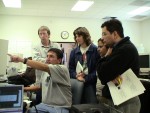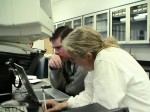A National Science Foundation funded Research Coordination Network project is off and running. The project, titled the “Resource Discovery Initiative for Field Stations,” aims to develop several critical databases that promote the discovery of personnel, data and information, and infrastructural resources at North American field stations (i.e., Organization of Biological Field Stations-OBFS). In addition, a key component of the project is the annual training of 12 to 24 field station personnel in information management concepts and technologies.
The first of five annual training workshops was successfully held October 20 - November 2, 2002 at the Sevilleta Research Station in central New Mexico. The workshop provided hands-on training in ecological informatics, metadata management, biodiversity data management, web page authoring, bibliographic database management, database management systems (DBMS), quality assurance/quality control, and advanced web page authoring. Trainees received hands-on experience with ACCESS, Dreamweaver, Biota, Endnote, Morpho metadata software, SQL, PERL, and the Specify biodiversity DBMS. Participants used the software to register data sets from their field stations in the OBFS Data Registry, to enter publications and bibliographies from their field stations into a web-accessible “Bibliography of North American Field Station Publications,” and to contribute standard field and laboratory methods to a Standard Methods database.
The workshop was attended by thirteen participants, representing biological field stations from Montana to Costa Rica and French Polynesia to Florida. A broad mix of real and virtual instructors served as instructors. The real (i.e., in-person) instructors came from the LTER Network Office (Bill Michener, James Brunt, Troy Maddux, and Marshall White), the Sevilleta LTER (Kristin Vanderbilt), the Central Arizona Phoenix LTER (Peter McCartney), the Virginia Coast Reserve LTER (John Porter), the University of New Mexico (Chris Frazier). Virtual instructors, including Matt Jones from the National Center for Ecological Analysis and Synthesis, Wade Sheldon from the Georgia Coastal Ecosystems LTER, Glenn Garneau from the University of Kansas, and Robert Colwell from the University of Connecticut appeared over Internet-based teleconferences.
Workshop participants appreciated the diversity of instructors. As one participant exclaimed, “No question went unanswered!” Furthermore, participants uniformly felt that the topics covered during the workshop will be very useful in expanding the informatics capacity at their field stations. “I truly wish that this course had been available three and a half years ago - an excellent course!” remarked one participant. This year (October 27-November 7, 2003) the two-week course will again be held at the Sevilleta and will be broken into two independent modules (one on ecoinformatics technologies, and the second on geographic information systems). In 2004, the course structure remains the same, but the venue moves to La Selva Biological Station in Costa Rica.

 Enlarge this image
Enlarge this image

